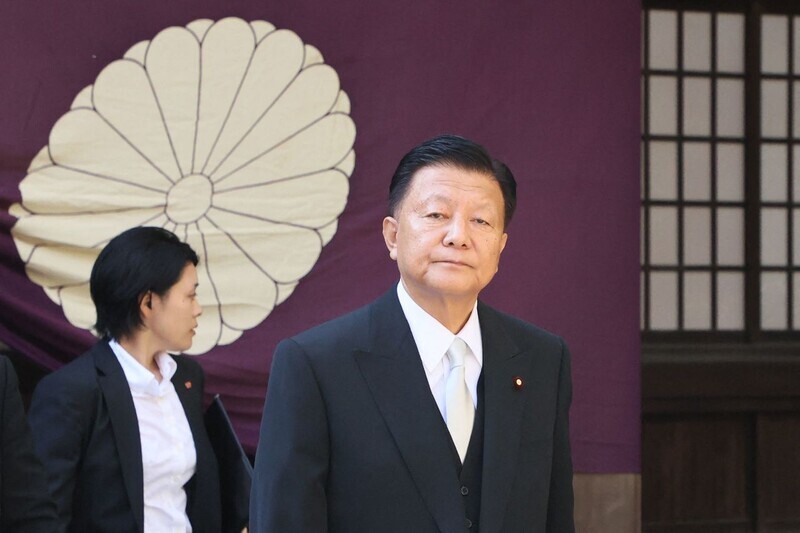hankyoreh
Links to other country sites 다른 나라 사이트 링크
Seoul voices “deep disappointment” over Kishida’s offering to shrine housing war criminals

South Korea’s Foreign Ministry responded Tuesday to an offering sent by Japanese Prime Minister Fumio Kishida to the controversial Yasukuni Shrine.
“The government expresses its deep disappointment and regret over the fact that senior figures in the Japanese leadership have once again given offerings or paid their respects at the Yasukuni Shrine, which enshrines war criminals and whitewashes Japan’s past wars of aggression,” said Lim Soo-suk, the spokesperson for the Ministry of Foreign Affairs, during the regular briefing that day.
“We call upon the responsible Japanese leaders to squarely face history and take action to demonstrate their humble reflection and sincere contrition about historical disputes. Our government will closely watch for any signs of major Japanese figures making offerings or paying their respects [at the shrine] during the mid-autumn festival and respond accordingly,” the spokesperson added.
Earlier, Kishida made a ritual “masakaki” tree offering signed “Fumio Kishida, Prime Minister” during the autumn festival, which began Tuesday. Since attaining the premiership in 2021, Kishida has made offerings to Yasukuni without personally visiting the shrine.
Yoshitaka Shindo, Japan’s economic revitalization minister, paid his respects at the shrine Tuesday, just as Minister of Economy, Trade and Industry Yasutoshi Nishimura had done the previous day.
Located in Tokyo, Yasukuni Shrine honors the spirits of the many soldiers who died in civil wars on Japanese soil and in wars waged by the Japanese Empire following the Meiji Restoration. Around 90% of the enshrined soldiers met their fates in the Pacific Theater of World War II (December 1941-August 1945).
Fourteen “Class A” war criminals — so-called because they bore responsibility for the war itself — were ritually enshrined at Yasukuni in 1978.
While Korea’s Foreign Ministry released statements immediately after Kishida’s offerings to the shrine last year and earlier this year, this time it ditched the statement in favor of remarks at a press briefing. That can be seen as toning down the government’s typical response to the shrine offerings and visits by a notch.
But the Foreign Ministry is reportedly considering whether to make a further response given the expectation that a group of key lawmakers in the Japanese Diet will pay a collective visit to Yasukuni on Wednesday.
By Shin Hyeong-cheol, staff reporter
Please direct questions or comments to [english@hani.co.kr]

Editorial・opinion
![[Editorial] Intensifying US-China rivalry means Seoul must address uncertainty with Beijing sooner than later [Editorial] Intensifying US-China rivalry means Seoul must address uncertainty with Beijing sooner than later](https://flexible.img.hani.co.kr/flexible/normal/500/300/imgdb/original/2024/0517/8117159322045222.jpg) [Editorial] Intensifying US-China rivalry means Seoul must address uncertainty with Beijing sooner than later
[Editorial] Intensifying US-China rivalry means Seoul must address uncertainty with Beijing sooner than later![[Column] When ‘fairness’ means hate and violence [Column] When ‘fairness’ means hate and violence](https://flexible.img.hani.co.kr/flexible/normal/500/300/imgdb/original/2024/0516/7417158465908824.jpg) [Column] When ‘fairness’ means hate and violence
[Column] When ‘fairness’ means hate and violence- [Editorial] Yoon must stop abusing authority to shield himself from investigation
- [Column] US troop withdrawal from Korea could be the Acheson Line all over
- [Column] How to win back readers who’ve turned to YouTube for news
- [Column] Welcome to the president’s pity party
- [Editorial] Korea must respond firmly to Japan’s attempt to usurp Line
- [Editorial] Transfers of prosecutors investigating Korea’s first lady send chilling message
- [Column] Will Seoul’s ties with Moscow really recover on their own?
- [Column] Samsung’s ‘lost decade’ and Lee Jae-yong’s mismatched chopsticks
Most viewed articles
- 1[Editorial] Transfers of prosecutors investigating Korea’s first lady send chilling message
- 2[Exclusive] Unearthed memo suggests Gwangju Uprising missing may have been cremated
- 3[Column] US troop withdrawal from Korea could be the Acheson Line all over
- 4‘Shot, stabbed, piled on a truck’: Mystery of missing dead at Gwangju Prison
- 5S. Korea “monitoring developments” after report of secret Chinese police station in Seoul
- 6[Column] When ‘fairness’ means hate and violence
- 7[Editorial] Intensifying US-China rivalry means Seoul must address uncertainty with Beijing sooner t
- 8US has always pulled troops from Korea unilaterally — is Yoon prepared for it to happen again?
- 9[Column] How to win back readers who’ve turned to YouTube for news
- 10Xi, Putin ‘oppose acts of military intimidation’ against N. Korea by US in joint statement